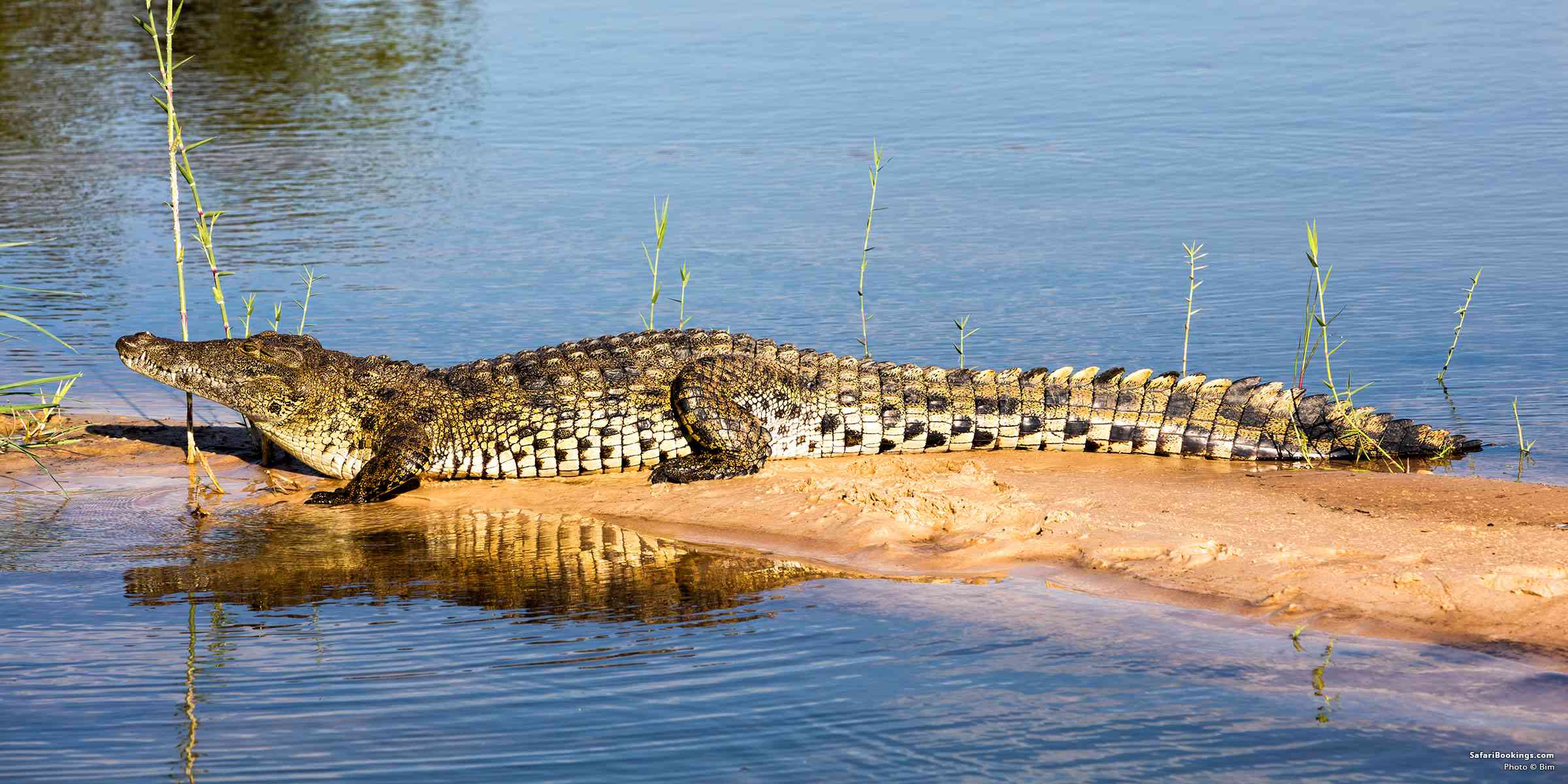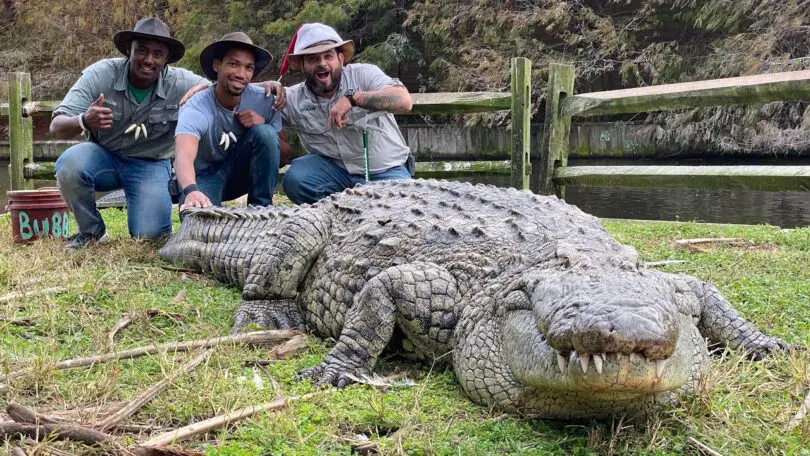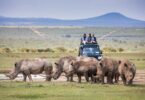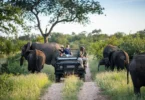A rich cultural history, distinct cuisine and natural beauty are all characteristic of West Africa. But in the water territory lies another famed tourist attraction across the world; the West African crocodile.
Also known as the Nile crocodile or the African crocodile, it is among the largest crocodilian species native to West Africa. It is a freshwater species that found in rivers, lakes, and swamps across the region.
It has a reputation for its aggressive behavior and is extremely dangerous. This species grows up to six meters (20 feet) in length and weighs up to 1,000 kg (2,200 lbs) but it is vulnerable according to IUCN.
Table of Contents
How Big Is The West African Crocodile?

West African crocodile. Photo/iNaturalist
The African crocodile adult male grows up to six meters (20 feet) in length and could bulk up 1,000 kg (2,200 lbs). Adult females are slightly smaller, growing to an average length of around four meters (13 feet) and weigh around 400 kg (880 lbs).
In character, the West African crocodile is aggressive and very territorial and will defend their territory from other crocodiles and humans. They are opportunistic hunters and will prey on a wide variety of animals, including fish, birds, mammals, and other reptiles.
They have a powerful bite, which allows them to kill large animals, and are add to their lethal hunting nature to being fast swimmers.
Are West African Crocodiles Endangered?
The International Union for Conservation of Nature (IUCN) considers the West African crocodile a vulnerable species. Their population is currently on the decline due to a variety of factors including habitat loss, hunting, and pollution.
Habitat loss is a recurring major factor in the decline of the Nile crocodile population. The destruction of wetlands, rivers, and lakes for agriculture, urban development, and other human activities has reduced the available habitat for crocodiles.
Hunting also poses a significant problem for the crocodile population. Historically, crocodiles were hunted for their skin and meat. Today, they are hunted for traditional medicine, and their body parts are, somewhat, used in certain ceremonies.
Pollution also contributes to the decline of this species as it affects the health and reproduction of the crocodiles. Lastly, conservation efforts are in progress to protect the West African crocodile and its habitat. These efforts includes the creation of protected areas, the implementation of hunting regulations, and the restoration of wetlands and rivers.
Does West Africa Have Crocodiles?
Yes, West Africa is home to the West African crocodile, also known as the Nile crocodile or the African crocodile. It is a freshwater species that found in rivers, lakes, and swamps across West Africa, including countries such as Senegal, Ghana, Nigeria, and Cameroon.
The Nile crocodile is one of the largest crocodilian species in the world and is famed for its aggressive behavior and powerful bite. Despite being considered as a vulnerable species by IUCN, they are still present in West Africa but their population is on decline due to various factors environmental among them pollution.

Nile crocodile. Photo/Safari Bookings
West African Crocodile Interesting Facts
Here are a few interesting facts about the West African crocodile:
- They are known to be very territorial and will defend their territory from other crocodiles as well as other animals, including humans.
- The West African crocodile is a powerful swimmer, and can swim at speeds of up to 35 km/h (22 mph).
- They have a very powerful bite, which is one of the strongest of any animal in the world. Their bite force can reach up to 5,000 pounds per square inch (psi).
- They are opportunistic hunters and will prey on a wide variety of animals, including fish, birds, mammals, and reptiles.
- They are known to have a very good memory and can recognize individual humans.
- They are known to be very intelligent, and have been observed using tools, solving problems, and exhibiting complex social behavior.
- They have a very long lifespan, and can live for up to 70 years or more in the wild.
- They have a complex system of vocalizations and body language, using different sounds, head movements, and postures to communicate with each other.
- The West African crocodile is a vulnerable species according to IUCN, and their population is on the decline due to habitat loss, hunting, and pollution.
- They play a significant role in their ecosystem as apex predators and help to regulate the population of other species.
West Africa is the one place you enjoy the sights of enormous-looking African crocodiles. Though they’re dangerous creatures, they add to the beauty of the land.
African Crocodile News
African Crocodile News
African Crocodile News
African Crocodile News
African Crocodile News
African Crocodile News
African Crocodile News
African Crocodile News
African Crocodile News
African Crocodile News
African Crocodile News
African Crocodile News
African Crocodile News
African Crocodile News
African Crocodile News
African Crocodile News
African Crocodile News
African Crocodile News
African Crocodile News
African Crocodile News
African Crocodile News
African Crocodile News
African Crocodile News
African Crocodile News
African Crocodile News
African Crocodile News
African Crocodile News
African Crocodile News
African Crocodile News
African Crocodile News
African Crocodile News
African Crocodile News
African Crocodile News
African Crocodile News
African Crocodile News
African Crocodile News
African Crocodile News
African Crocodile News
African Crocodile News
African Crocodile News
African Crocodile News
African Crocodile News
African Crocodile News
African Crocodile News
African Crocodile News
African Crocodile News
African Crocodile News
African Crocodile News
African Crocodile News
African Crocodile News
African Crocodile News
African Crocodile News
African Crocodile News
African Crocodile News
African Crocodile News
African Crocodile News
African Crocodile News
African Crocodile News
African Crocodile News
African Crocodile News
African Crocodile News
African Crocodile News
African Crocodile News
African Crocodile News
African Crocodile News
African Crocodile News
African Crocodile News
African Crocodile News
African Crocodile News
African Crocodile News
African Crocodile News
African Crocodile News
African Crocodile News
African Crocodile News
African Crocodile News
African Crocodile News
African Crocodile News
African Crocodile News
African Crocodile News
African Crocodile News
African Crocodile News
African Crocodile News
African Crocodile News
African Crocodile News
African Crocodile News
African Crocodile News
African Crocodile News
African Crocodile News
African Crocodile News
African Crocodile News
African Crocodile News
African Crocodile News
African Crocodile News
African Crocodile News
African Crocodile News
African Crocodile News
African Crocodile News
African Crocodile News
African Crocodile News
African Crocodile News
African Crocodile News
African Crocodile News
African Crocodile News
African Crocodile News
African Crocodile News
African Crocodile News
African Crocodile News
African Crocodile News
African Crocodile News
African Crocodile News
African Crocodile News
African Crocodile News
African Crocodile News
African Crocodile News
African Crocodile News
African Crocodile News
African Crocodile News
African Crocodile News
African Crocodile News
African Crocodile News
African Crocodile News
African Crocodile News
African Crocodile News








